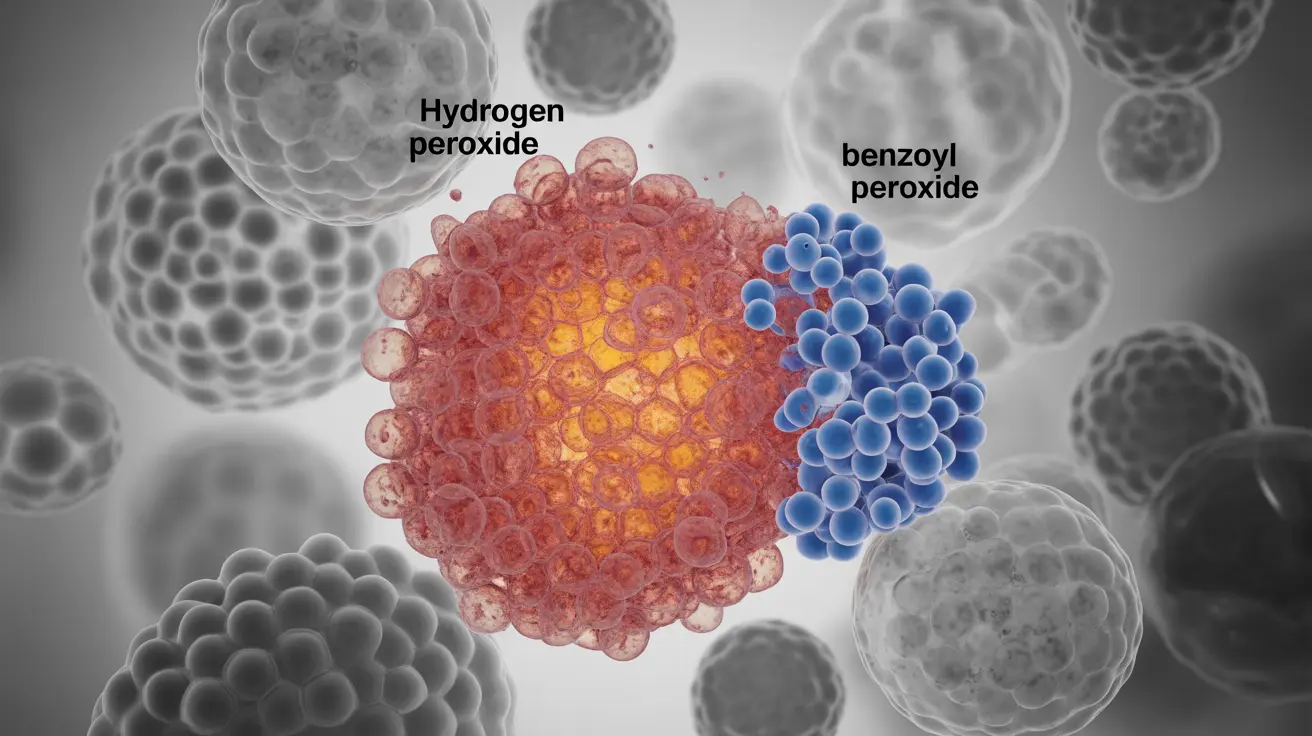Many people searching for acne treatments might consider using hydrogen peroxide, a common household disinfectant, to combat their breakouts. While this readily available solution is known for its antimicrobial properties, its use as an acne treatment requires careful consideration of both safety and effectiveness.
Understanding the potential risks and benefits of hydrogen peroxide for acne is crucial before incorporating it into your skincare routine. This article examines the scientific evidence, compares it to proven treatments, and offers safer alternatives for managing acne-prone skin.
How Hydrogen Peroxide Works on Skin
Hydrogen peroxide is an oxidizing agent that creates free radicals when it comes into contact with organic material. While this action can kill bacteria, it also affects healthy skin cells in the process.
The oxidizing properties of hydrogen peroxide work by:
- Breaking down bacterial cell walls
- Destroying organic material indiscriminately
- Creating oxygen bubbles that may help remove debris
Risks and Safety Concerns
Despite its antibacterial properties, using hydrogen peroxide for acne comes with significant risks that shouldn't be overlooked:
Potential Skin Damage
Regular application of hydrogen peroxide can cause:
- Irritation and redness
- Dryness and peeling
- Disruption of the skin barrier
- Chemical burns if concentration is too high
- Delayed wound healing
Impact on Skin Health
The oxidative stress caused by hydrogen peroxide can lead to:
- Premature aging of skin cells
- Inflammation that may worsen acne
- Possible scarring
- Hyperpigmentation
Hydrogen Peroxide vs. Benzoyl Peroxide
While both compounds contain peroxide, they work differently on the skin. Benzoyl peroxide is specifically formulated for acne treatment and offers several advantages:
Benzoyl peroxide benefits include:
- Targeted antimicrobial action
- Controlled release formulation
- Proven safety record
- FDA-approved for acne treatment
Safer Alternatives for Acne Treatment
Instead of hydrogen peroxide, consider these evidence-based options:
Over-the-Counter Solutions
- Salicylic acid
- Benzoyl peroxide products
- Niacinamide
- Tea tree oil
Prescription Options
- Topical retinoids
- Antibiotics
- Combination treatments
- Oral medications for severe cases
Frequently Asked Questions
Is hydrogen peroxide safe and effective for treating acne?
No, hydrogen peroxide is not considered safe or effective for treating acne. While it may kill bacteria, it can also damage healthy skin cells, potentially leading to irritation, inflammation, and delayed healing.
What are the risks and side effects of using hydrogen peroxide on acne-prone skin?
The main risks include skin irritation, chemical burns, increased inflammation, disrupted skin barrier function, and potential scarring. Long-term use can lead to premature aging and hyperpigmentation.
How does hydrogen peroxide compare to benzoyl peroxide for acne treatment?
Benzoyl peroxide is significantly safer and more effective than hydrogen peroxide for acne treatment. It's specifically formulated for skin use, FDA-approved, and provides targeted antimicrobial action without causing excessive damage to healthy skin.
Can hydrogen peroxide cause scarring or worsen acne inflammation?
Yes, hydrogen peroxide can cause scarring and worsen acne inflammation due to its harsh oxidizing effects on skin tissue. It can damage healthy cells and delay the natural healing process.
What are safer and more recommended alternatives to hydrogen peroxide for acne?
Safer alternatives include over-the-counter products containing salicylic acid, benzoyl peroxide, or niacinamide. For more severe cases, prescription treatments like topical retinoids or antibiotics are recommended. Always consult a dermatologist for personalized treatment advice.
Remember to always prioritize gentle, scientifically-proven acne treatments over harsh home remedies. Your skin's health and safety should be the primary consideration when choosing any acne treatment method.




